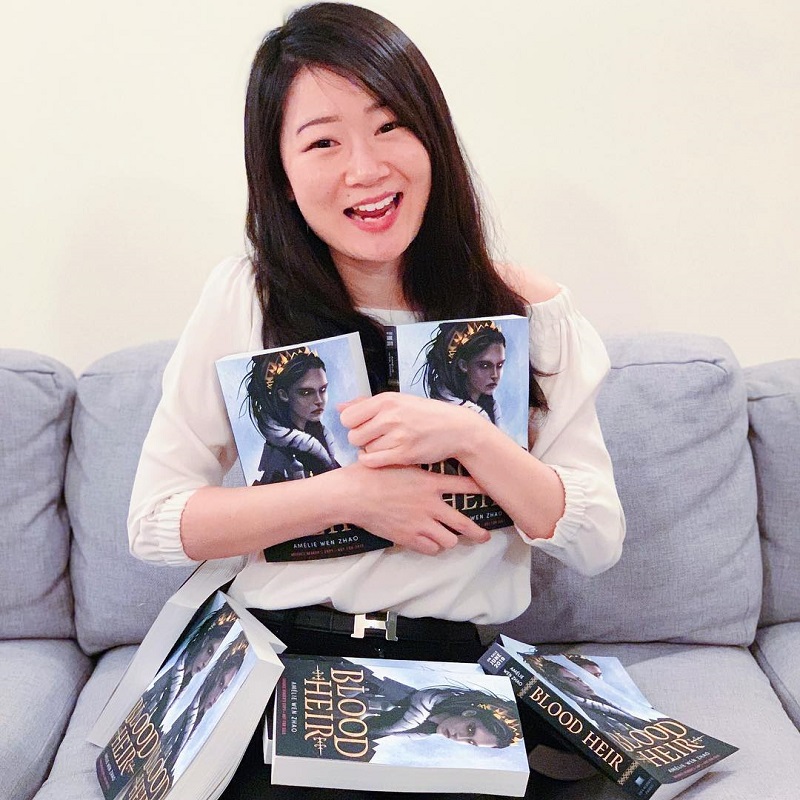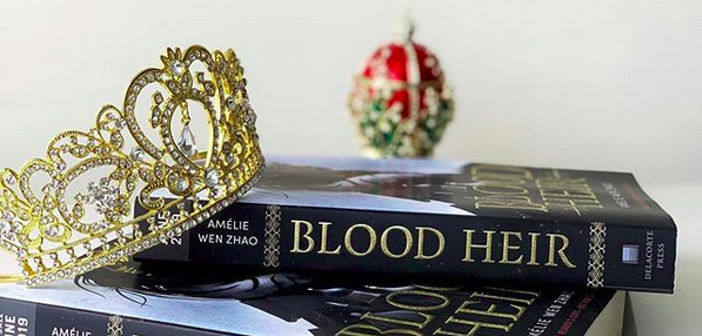Amélie Wen Zhao grew up in Beijing, and attended the International School of Beijing (ISB). She always dreamed of being a writer, and after moving to New York to work in the financial sector spent years working on her novel Blood Heir. When she was offered a major contract with Penguin Random House, it was a dream come true.
Unfortunately the book made headlines for the wrong reasons, before it was even published. Another author accused Blood Heir of racism, provoking a Twitterstorm. Wen Zhao voluntarily withdrew her novel from publication. However the backlash itself triggered a backlash, as it was apparent that many of those attacking the book had not even read it. The controversy caused soul-searching in the world of Young Adult (YA) fiction, with people asking whether well-meaning attempts to ensure diversity in publishing were actually silencing important voices. Following some thought and some revisions to the text, Wen Zhao is now proudly celebrating the worldwide publication of Blood Heir. She spoke to beijingkids about her writing, and her experience of growing up in Beijing.

Amélie Wen Zhao
Do you have any memorable experiences, related to the literary arts, from your time at ISB? Any faculty members who really inspired, mentored, or advocated for you?
Thanks to my beloved and practical-minded Chinese parents, I was actually on track to study economics/finance for my college years – I knew I had to be able to feed myself and pay my bills first. So, at ISB, I took the IB Diploma with subjects of Higher Level Economics, Higher Level English, and Higher Level Biology; Standard Level Chinese, Math, and Psychology. The courses I enjoyed most were, no doubt, English and Economics (which speaks to the two careers I currently hold in publishing and finance). Michael Green was my economics teacher throughout high school and we are still in touch today; he truly was one of the best teachers of my high school years, and continues to inspire me today with his travel, volunteer work, and involvement with the ISB community. He is organizing a New York alumni reunion early next year, which I look forward to attending.
All of the English teachers that I have studied with were so inspirational to me (in particular, Ms. Cole, Mr. Roberts, and Ms. Carlson), and gave me the foundations to critical thinking, examining work through multiple, global perspectives, and weaving literary devices into writing to drive home important themes through art. English was always my favorite class to attend and I remember always looking forward to the next book we were going to read, and learning about different cultures and histories and current events through them.
How do you think your experience at an international school in Beijing informed your writing?
The international education at ISB was formative to not only my writing, but to my upbringing as a person. The international education is a one-of-a-kind experience with a global-minded student body comprising children and young adults from many places around the world, and that is one of the international community’s greatest assets. As well, the curriculum of international courses and histories is foundational to opening the students’ eyes and minds to many aspects and perspectives of the world. It is thanks to the diverse ecosystem of thought instilled into me at ISB that I continue to seek new cultures to understand and new perspectives to explore. I think that’s what makes me strongest, as both a writer and a human being.
You’ve clearly traveled quite extensively, and have called many places home. How has that formed the person that you are today?
For a long time throughout my childhood and teenage years, I struggled with the notion of fitting in. Growing up straddling multiple countries and cultures, it felt like a constant balancing act – that if I leaned in too heavily in one direction, I would lose other parts of my cultural heritage. In some ways, Blood Heir explores this theme of the “Other” (a concept which I remember learning first from tenth grade English, reading Heat and Dust by Ruth Prawer Jhabvala). The protagonist of my book, Anastacya, has a terrifying power to control blood – and each of the characters have their secrets and parts of their identity that they wish to hide.
Blood Heir is about learning to accept that which makes you different. In the same way, I’ve learned to love the strange cultural puzzle that I am as a result of my international upbringing, and I’ve come to view it as a strength of mine instead of something to hide.
Blood Heir is also about royalty, palace intrigue, corruption, and conspiracy. Where did these themes come from? Why did you think it important to explore them?
These were all themes that I read or wanted to read as a teen in high school! When I set out to write Blood Heir, I wanted to write a book that was entertaining, but one that also mattered. And thus, I wove in the scheme of corruption that Anastacya uncovers across her empire: the rings of human trafficking and indentured labor that thrived between the cracks of the laws. These are topics relevant to today’s world as well as my heritage and history that I hadn’t seen explored in young adult literature, and I wanted to introduce something new from my unique perspective as a Chinese woman raised in an international community living in the United States.
Working in the financial sector during the day, where and when do you find the time to write?
It can be hard to find the blocks of time needed to write novels while working in the financial sector. I wrote most of Blood Heir between the hours of 9pm – 1am and during the weekends. It took me three years to write and rewrite, and another two to revise with my editor throughout the publishing process. I thrive on being as productive as I can, and I love perfecting my time management skills to be able to squeeze as much time out of my day as possible!
Can you give us any hints about your next book?
I’m currently contracted to finish writing the Blood Heir Trilogy, but I’ve been sitting on a fantasy story idea that is basically an analogy to my life: a girl, from multiple worlds, trying to find where she fits in and where she’s from. If I do get to write it (fingers crossed!) it’ll be truly special.
Anything else you’d like to share?
I’m truly honored and excited to be featured in a magazine in my home community! I was shy and trying to find out where I fit in throughout high school, and brimming with the basket of dreams and insecurities that come with being a teenager. I hope the children and young adults chasing their dreams in our community won’t give up. Just yesterday, it seems I was writing fantasy stories on my computer at home in Beijing, lost and wondering if I’d ever achieve my dream of being an author; today, my book is being published by Penguin Random House and across eight foreign territories. Dreams do come true.
Interview by Drew Pittock
Photos: www.instagram.com/p/B2UXNcmgjUO/




